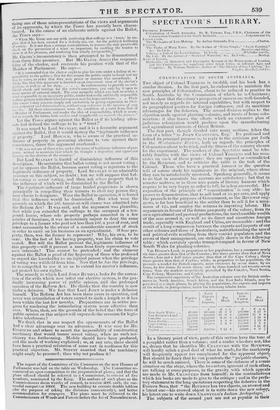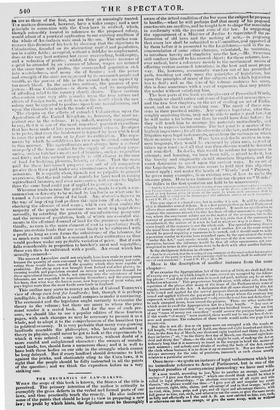COLONIZATION OF SOUTH AUSTRALIA.
THE object of Colonel TORRENS is twofold, and his book has a similar division. In the first part, he endeavours to maintain the new principles of Colonization, about to be reduced to practice in South Australia by the Commission of which he is Chairman; and to show that the colony's prospects of success are well-founded, not merely as regards its internal capabilities, but with respect to its geographical position for foreign conImerce, and its maritime advantages for the fisheries. The second division replies to the objection made against planting colonies, and treats of home colo- nization: it also traces the effects which an extensive plan of judicious colonization would produce upon the manufacturing and agricultural interests of Great Britain. The first part, though divided into many sections, takes the form of a letter " to Joire Citaiveuen, Esq." Its professed and indeed its principal purpose is, to reply to the criticism put forth in the Westminster Review, both as regards the principles of Colonization about to be tried, and the fitness of tile country chosen for the experiment. The readers of the Spectator must be tole- rably familiar with the views of Colonel ToiteENs and his asso- ciates on each of these points : they are opposed or contradicted by the Reviewer, and to criticize the critic is the task of the Colonel. Those who have a practical interest in the question will of course study his arguments in the original, where alone they can be satisfactorily mastered. Speaking generally, it seems to us that in essentials his answers ate satisfactory ; but that in remoter matters, or in those nice points of literary humour which require to be very happy in order to tell, he is less successful. His exposition of the principle of " concentration " is very able : he proves to demonstration, that to sell land at 55. per acre, and apply the proceeds to the purposes of Government, as the Reviewer sug- gests, is far less beneficial to the settler than to sell it for a mini- mum of 12s. and employ the returns in importing labour. His arguments in favour of the future prosperity of the colony, from its own agricultural and pastoral productions, the inexhaustible wealth of the seas around it, as well as its direct and circuitous foreign trade, especially with England and China, are reasonable : and the result of a long comparison between the exports and imports of our other colonies and those of Australasia, notwithstanding the moral and political evils resulting front their convict population and the errors of their management, are strikingly shown in the following table; which certainly speaks trumpet-tongued in favour of New South Wales for planting colonies.
Van Diemen's Land, in proportion to her population, has a commerce nearly six times greater than that of the Canadas; five tittles greater than that of Nova Scotia ; four and a half times greater than that of the Cape Colony ; thirty times greater than that of Ceylon ; while, in proportion to her population, she presents a market fur British exports, more extensive by seven tunes, by six times, by five times, by seven tittles, and by three hundred and seventy-seven times, than the markets respectively presented by the Canadas, Nova Scotia, Cape Colony, Mauritius, and Ceylon. The commercial superiority of the Australian colonies over the British settle- ments in North America, Swath Africa, and the East India Islands, may be perceived at a single glance, by placing the populations, the exports and imports of the whole, in juxtaposition, under the following tabular form.
In a literary point of view, parts of this section have the tone of a pamphlet rather than a volume; and a reader who does not, like us, dream that he identifies Mr. CRAWFURD with the Reviewer, will hardly relish a good deal of what he reads, for the machinery will frequently appear too complicated for the apparent object. But should he fancy that lie can penetrate the "palpable obscure," he will be much amused. There is some of the richness of a comic situation on the stage, where the two actors, ignorant of each other, are talking at cross-purposes, in the gravity with which appeals are made to Mr. CRAWFURD from himself; in the contradictions which his books are made to give to the critique ; and in the prefa- tory statement to •the long quotations respecting the fisheries in the Eastern Seas, that " the Reviewer has two objects, an avowed and a latent one—his avowed object is to write down the new colony, his latent one to write down CRAWFURD'S Indian Archipelago.' The subjects of the second part are not so popular in their
•
s. d. d.
96S,000 16 0 0 410,00 6 12 8 0011,000 1 20 0 0 :A3,000 11 0 0 9.5.,vou 3 lo o 1.134;000 1 10 0 743,ouu 4 o u 311.00o 1 15 0 5ott,oco 4 9 0 j 2S1,000 2 0 0 14,000 0 11 6 620,000 0 13 0 1 25,000 0 0 7 ! Popula-
tion.
Saul ii Wale.; 00.006 Divmen's Laud 310I it, ulas 7-0.000 Nova Sew ia 171.000 Car., Colony 1211000
94.000 Ion Per (lead Per Stead.
Total F.xvorts and Imports. Imports trim] United Kingdom. lea ure as those of the first, nor are they so amusingly treated. Ti a matters discussed, however, have a wider range; and a new principle ill connexion with the Corn-laws is evolved, which, though ostensibly treated in reference to the proposed colony, would admit of a practical application to our existing condition if the whole of Australasia were sunk in the sea. The author com- mences this division of his Leek by showing that the objections to Colonization, founded on its abstracting. capieol and population, arc in reality futile; as capital, without a lieldefur its employment, floes at the very best nothing but cause overtrading, bankruptcy, and a reduction of profits; whilst, if this plethorie increase of eepital be attended by an increase of labour, wages are reduced at the saute time with profits, the overcroudad populatien sink into wretchedness, and many die of famine ; and the power and strength of the state are op;wessed by its overmuch people and wealth. as the powers of life in the animal body are injured by too much blood. In the next two sections, the panacea of pro- jectors—Home Colonization—is disco: sad, and incapability of affording relief to the country clearly shown. These sections
also contain some very able rcinaiks upon the true nature and effects of foreign trade, as well as upon the result %vhich the new colony may be expected to produce upon home manufactures, and upon the channels in which the trade will run.
The chapter on the effects of extended Colonization upon the Aglieulture of the United Kingdom, is, however, the' most im- portant one in the volume. It is, indeed, scarcely exaggerating to say, that it is one of the most important practical expositions that has been made of late years in econotnieal scieu.e. Its object is to prove, that even the laialowner is injured by• laws which tend to raise the /,rice of corn or to his cultkatlai. The argu- ments by which lie establishes \ le'x may be stated somewhat in this manner. The agriculturists ant:-:t always have a natural manopo..'y a the hone• market for the surply or sae is dory- neces- saries, -nob as butcher's Hiatt; atr.l of lexurie.:, ,ugh a vegetables and fruit; and this natural monopoly is still clearer in the case of 1;11111 for builaing, pleasure, luxury, or show. That the rents paid for these last liatile:1 purposes are out of all coin pa rison grt tiler than those paid under any cieeanstices for coral-land, is notorious. It is equally clear, though not so palpable to general experience, that the real value of rentals for land used in raising agricultural luxuries, and even necessaries, Yyill aal'rays be higher than the same laud could pay if applied to growi:a4 , orn.
1Vhatever tends to raise the price of core, leads to check a con- summation so deviratly to be wished by Ian llorls as what may be termed a laxarious dema.ai for land. Any olestileles thrown in
the way of imp 3.04; food reduce this inju.ious et,—hest, by checking the advance of real wagee which can alone enable the majority of the people to consume more moat anti. vegetables; secondly, by retarding the growth of manuficturing prosperity and the increase of population, both of which are essential ele- ments in the effectual demand of land for the purposes spoken of; thirdly, as corn is the main clement of cost Iii reproducing itself, there are certain lends that arc never likely to be cultivated with a profit as long as corn forms the subsistence of the labourer, for as much corn would still be censumed in their cultivation as they would produce under any probable variation of price. But if corn falls considerably in proportion to butcher's meat and vegetables, these can then be cultivated with a profit. An event which has . actually eccurred-
The moors of Lancashire could not originally have been made to grow corn, because the quantity of corn consumed by the labourers reclaiming and culti- vating them would have exceed:it the quantity which they were capable of producing. But cheap coin was brought from Ireland amt other places ; in- creasing wealth and population created an intense and txteusive demand for those agricultural luxuries, which, not entering into the subsistence of farm labourers, are not expended in reproducing themselves ; and the consequence has been, that what was the barren moor, now bears crops of great value, and pays higher rents than the most fertile corn-lands in England.
This outline may serve to convey an idea of Colonel TORRENS'S view of cheap corn best ,fir landlords; but, though it is perhaps intelligible, it is difficult in a small compass to make it convincing. The economist and the legislator ought certainly to examine the theory in the volume; but there are many to whom the price must render it a sealed book. And for the use of such per- sons, we should like to see a popular edition of these fourteen pages, with such changes as may be necessary to present it as a whole, and to adapt it to the comprehension of the humblest tyro in political economy. It is very probable that many corn-growing landlords resemble the philosopher, who, having advanced a theory in physics, could never be got to look at the experiments by which it was refuted : some are, however, without doubt of a more candid and enlightened character : the owners of unculti- vated lands, too, should form a numerous class; and it is well to have both these bodies on our side in the struggle which cannot be long delayed. But if every landlord should determine to kick against the pricks, and obstinately cling to the Corn-laws, it is right that the people should be fully instructed in all the points of the question; and we think the exposition before us a very striking one.



























 Previous page
Previous page